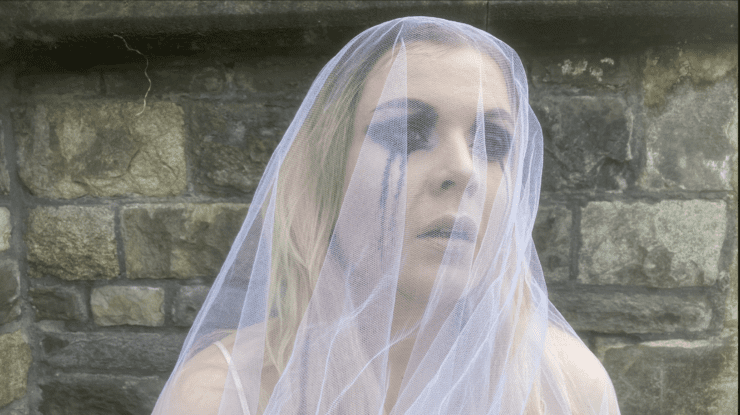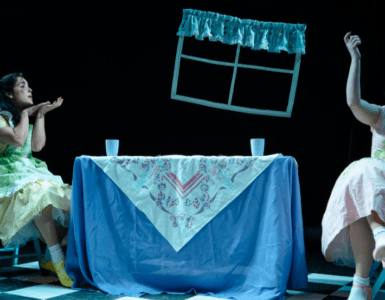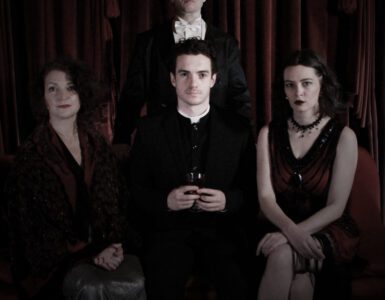I’ve never felt sorry for Miss Havisham before.
Allow me to explain. I’m an avid fan of Charles Dickens. Great Expectations is by far my favourite novel. The white clad figure who kicks off much of the action evokes so many emotions: fear, anger, outrage, and just full blown histrionic, meshuga melodrama on an epic scale. Miss Havisham, like so many of Dickens’ most iconic characters is larger than life. You admire her. You fear her. You may even hate her. You don’t pity her.
Yet, in Dominick Argento’s one woman opera: Miss Havisham’s Wedding Night. We see a different Miss Havisham. A more vulnerable, saddened Miss Havisham. And it makes her human; something she (almost) never is in Dickens’ novel.
The opera takes place in an ruined, rotting room in Miss Havisham’s ruined, rotting house. The house which she laid to waste and shut up decades ago, after she was jilted at the alter. According to Dickens’ legendary story, Miss Havisham stayed in that room and in her wedding dress, brooding and growing old ever since. Miss Havisham’s Wedding Night picks up there: on one of Miss Havishman’s decades’ worth of wedding nights as she relives the same night over and over again, stuck on the day her lover abandoned her at the alter. Throughout the one act opera, sung by the soprano Rosie Rowel, Miss Havisham cycles through every emotion imaginable from eager anticipation for her wedding day to anguish. What struck me most in that hurricane of feelings, however, was the strong sense of vulnerability that pervaded the singer, the music, everything. The music and the text chose to focus on the more positive moments in Miss Havisham’s day, before she stopped the clocks and laid the house to ruin.
For example, she repeatedly calls upon her nanny, surely a person who was long gone from her life, to dress her and get her ready for this moment in her life when she leaves her girlhood behind. Rowel’s eyes, as she stood and called out to no one in that dusty old house told a story of a hopeful young woman, completely unaware of how cruelly the world was going to treat her in a matter of hours. She was sweet, pretty, brave, and completely at the mercy of a criminal. I found myself sympathizing with her: something you rarely do in Dickens’ original novel. This one act meditation, as we follow Miss Havisham through the watches of another night and through the round of feelings a jilted woman would feel made Miss Havisham into a real woman and a real person, fleshing her out in a way the novel doesn’t really. Miss Havisham was vulnerable. It was poignant.
Small details, mainly in production, somewhat lessened the poignancy of this image. For one thing, I was disappointed that they chose to portray Miss Havisham in a tattered nightgown and wedding veil, rather than the iconic, old wedding dress. Another costuming, or rather makeup-related decision led to a lot of confusion for me. Rowel was a young singer and there was no attempt to hide her youth, even though the opera is supposed to take place decades after Miss Havisham was jilted. Miss Havisham should have looked middle aged or even old. To a casual viewer, unnaquainted with the plot of the opera, it would seem that Miss Havisham’s Wedding Night takes place on the night that she was jilted, since the singer was presented as young.
It was only at the very end of the opera, when Miss Havisham calls in Estella who (according to the book) she adopts years later, did I figure out that Miss Havisham was supposed to be old. It caused me a lot of confusion and took me out of the moment. Some simple aging hair and makeup tricks might have made her age obvious immediately, and would have allowed for better artistic continuity. It was a pity because, throughout the whole opera I believed Miss Havisham was young, and it helped me to paint a characterization of her as recently wounded as still aching from that wound. Realizing, only at the end, that Miss Havisham was supposed to be old meant I had to re-evaluate my whole understanding of her character, breaking down the perception of her I had built up throughout the entire opera. Again, some simple hair and makeup changes would have told the story the creators wanted to tell right away.
I also think the varying emotions of Miss Havisham would have been more strongly conveyed in a different musical style. The opera was sung through, without any discernible arias or recitatives, after the style of modern opera, which, while musically complex, isn’t very approachable. Melodies, I believe, would have added a lot of beauty to a beautiful and vulnerable character and, even though it would be old fashioned, would be fitting for a character known for stopping all the clocks and ignoring the passage of time.
Recommended Drink: A white wine from the nineteenth century. Is it still good? Who cares. It’s sat and moldered in the same place for years, just like Miss Havisham.
Performances of Miss Havisham’s Wedding Night have now concluded at EdFringe 2023. Keep up with the performers online for future showings.









